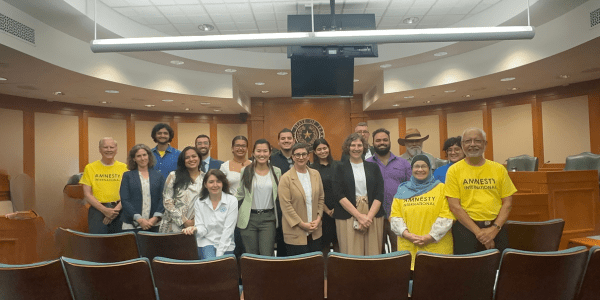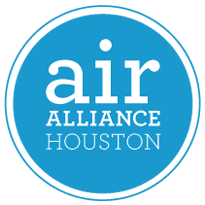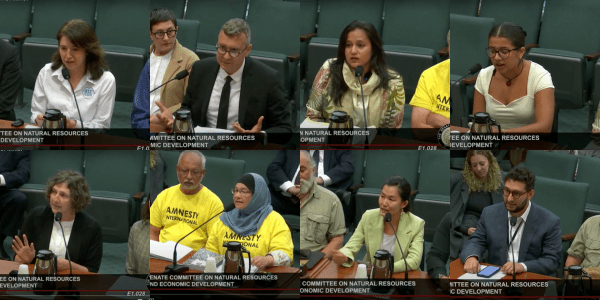
Riikka Pohjankoski
Communications Director
The Texas Legislature is in Interim Session, the time when they consider topics for possible legislation in the next General Session beginning January 2025. In response to Lt. Governor Dan Patrick’s Interim Charge to consider rolling back recent EPA clean air regulations, Air Alliance Houston (AAH) staff, partners, and community members traveled to Austin to provide testimony at the Texas Senate’s “Overcoming Federal Incompetence” hearing. Our advocates made a powerful case for why these updated air quality standards are vitally needed to protect the health and economic well-being of all Texans.

Context: New, Stronger Protections
The U.S. Environmental Protection Agency (EPA) has recently enacted a series of robust rules aimed at protecting communities from pollution:
- Tighter Limits on Harmful Particulates: The National Ambient Air Quality Standard (NAAQS) for health-harming PM2.5 has been lowered from 12 to 9 micrograms per cubic meter.
- Stronger Disaster Prevention Measures: The Safer Communities by Chemical Accident Prevention rule introduces the strongest chemical disaster prevention measures in U.S. history, including specific measures aimed at mitigating impacts of extreme weather events.
- Enhanced Controls on Carcinogens: New rules address Ethylene Oxide (EtO) and the National Emission Standards for Hazardous Air Pollutants (NESHAP) to better control cancer-causing emissions.
- Hazardous Chemicals Review: Reviews of hazardous chemicals like vinyl chloride could lead to nationwide bans or phase-outs, preventing future disasters similar to the one in East Palestine, OH, last year.
- Coal-Fired Power Plant Regulations: Four different rules, including the Mercury and Air Toxics Standard (MATS), address emissions from coal-fired power plants, such as the W.A.Parish plant in Fort Bend County, the dirtiest coal plant in Texas.
These rules are not arbitrary; they are grounded in rigorous scientific research and extensive community outreach, ensuring they reflect both the best available science and the voices of those most affected by pollution.
The Need for Better Rules
Houston consistently ranks as one of the most polluted metropolitan areas in the nation according to various reports. This status underscores the need for stringent federal oversight, especially given the Texas Commission on Environmental Quality’s (TCEQ) reluctance to regulate industry.
The health impacts of pollution are particularly severe in underserved communities. Dyllan Losano-Lomeli, a student at Rice University, highlighted this disparity during the hearing saying, “A 2017 Rice University study found that 13% of Black children in Houston have asthma compared to 7% of Hispanic children and only 4% of white and Asian children. It is unfair to not acknowledge how these communities will be disproportionately impacted by further pollution.”
Jennifer Hadayia, Executive Director of AAH, emphasized the life-saving potential of the new EPA rules:
Strengthening the PM standard will prevent 4,500 premature deaths, save 300,000 lost workdays, and reduce $46 billion in healthcare costs annually.
Personal Testimonies Highlight Pollution’s Toll
Several community members and advocates shared personal stories about the toll of pollution on their lives and families, putting a human face on the statistics and charts.
Crystal Ngo, Environmental Justice Coordinator at AAH, spoke about her struggles with asthma and breathing issues related to air pollution. “It’s not just a personal issue—it’s a community issue.” Growing up in Houston, Ngo always relied on her inhaler. However, it wasn’t until she returned home after six years away for college that she truly grasped the severity of the pollution, as she found herself struggling to breathe again.
Leticia Gutierrez, Government Relations and Community Outreach Director for AAH, described the impact of industrial negligence near the Houston Ship Channel on her family. “After my son’s pediatrician linked consistent upper respiratory issues to TPC [Group]’s chemical releases,” Gutierrez said, “I left my career in finance and economics to dedicate myself to cleaning up my east and southeast community.”
Erandi Treviño, a member of the Healthy Port Communities Coalition (HPCC), shared her family’s struggles with chronic illness due to pollution near industrial facilities. “Every single member of my household has health problems related to the industry,” Treviño said, “We experience lightheadedness, dizziness, and chronic pain, Living within two miles of the Ship Channel increases a kid’s chances of childhood leukemia by 56% compared to 10 miles away.”
Mohammad Nasrullah, co-founder of Amnesty International’s Bay Area Houston chapter, discussed the daily struggles of living in a polluted area:
Every week, the air smells of chemicals, gasoline, even hydrogen sulfide, which really stinks. Every time there is an accident or a fire in one of these many chemical plants that are just adjacent to where we live, the air quality is so bad that it causes our eyes to sting and get watery, and we are forced to stay indoors.
Ngo, Gutierrez, Treviño, and Nasrullah were just a few of the many community members and advocates who voiced their concerns and support for maintaining strong clean air regulations. Watch the recording of the full hearing here.
Pollution is a Policy Choice
Without federal oversight, communities across Texas—particularly those near industrial facilities—will continue to suffer from elevated pollution levels. Alex Spike, Climate Justice Coordinator at AAH, highlighted this issue:
Pollution doesn't just appear in our neighborhoods. It's a policy choice that y'all have an opportunity to influence.
Rather than resisting the EPA rules, our state leadership should study how reducing pollution and preventing chemical accidents benefit both human health and economic growth in our state, said Hadayia. Adding that “resisting, delaying, or undermining these benefits is the true harm to Texas.”
CALL TO ACTION
As Houstonians, we cannot afford to lose these vital protections. Join us in urging our state representatives to prioritize the health and well-being of all Texans by maintaining and implementing the EPA’s clean air regulations.
- Contact your representatives, attend local hearings, and support organizations advocating for cleaner, safer communities. Together, we can ensure a future where clean air is a reality for all Texans.
- The Senate Committee on Natural Resources and Economic Development will reconvene on September 17 to re-consider the Charge concerning EPA protections. Make sure you’re subscribed to our email list to receive updates about this upcoming meeting. Subscribe here
- Watch our Executive Director make comments:

